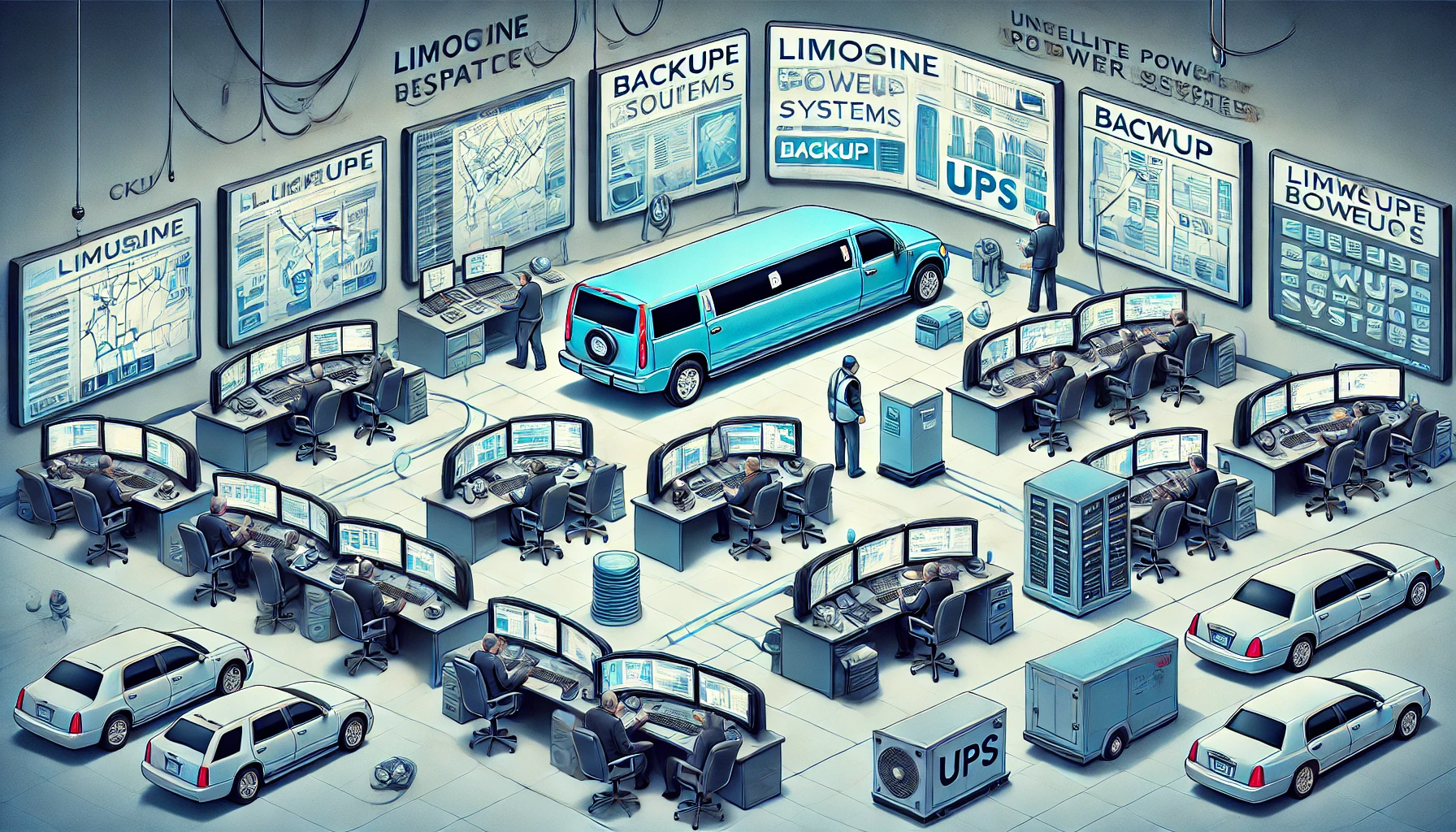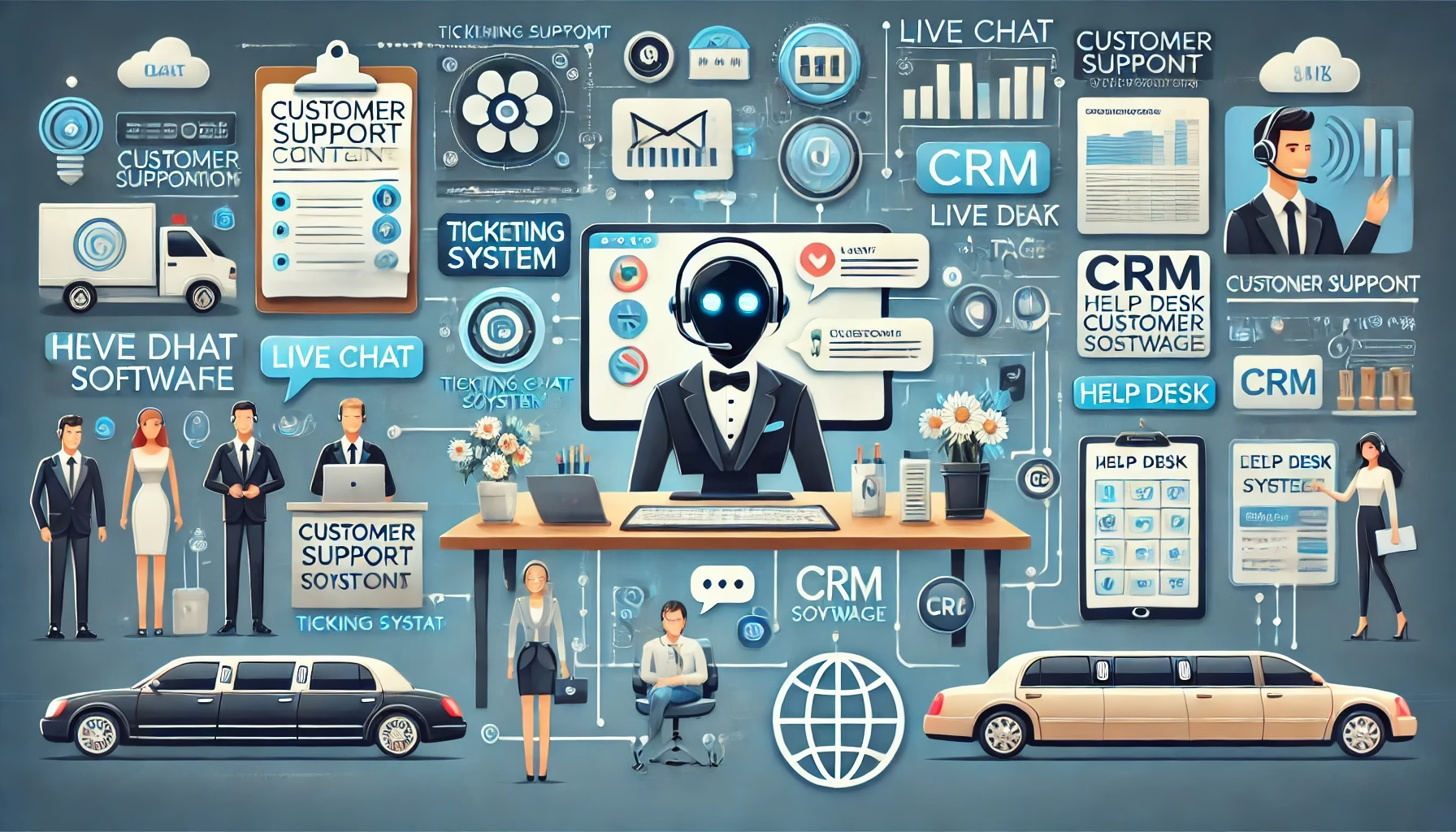Introduction
In the fast-paced world of limousine dispatch, every moment counts. Dispatch operations are at the heart of a seamless transportation service, ensuring timely pick-ups and safe journeys for clients. The importance of back-up dispatch systems and redundancies cannot be overstated. These systems safeguard against unexpected failures, enabling dispatchers to deliver reliable service consistently. This article delves into the key aspects of redundancy and backup in dispatch operations, presenting solutions for ensuring smooth, uninterrupted service.
1. System Downtime: An Unavoidable Reality
Issue:
Even the most advanced dispatch software and technologies can experience downtime due to updates, server issues, or unexpected malfunctions. When a system is down, it can severely impact the ability to track vehicle locations, assign drivers, and communicate with clients. For a limousine service, even a minor delay can affect the reputation of reliability and punctuality.
Solution:
Implementing a well-structured backup system minimizes downtime. One effective solution is to maintain a backup cloud-based dispatch system that automatically activates when the primary system encounters issues. This alternative system can handle basic functionalities such as client bookings, vehicle tracking, and driver assignments.
Additionally, regular maintenance checks and preemptive system audits can prevent many common software malfunctions. Training staff to switch seamlessly between the primary and backup systems ensures minimal disruption. Dispatchers should be comfortable with both systems to avoid delays caused by unfamiliarity.
2. Power Outages: A Major Risk to Continuity
Issue:
Power outages, though sometimes brief, pose a significant threat to continuous dispatch operations. During power failures, electronic devices, servers, and dispatch software become inoperable, affecting the entire chain of communication from dispatcher to driver.
Solution:
Investing in uninterruptible power supplies (UPS) for all critical equipment, including computers, routers, and communication devices, can prevent sudden shutdowns. Generators provide long-term support, maintaining power until primary utilities are restored. When dispatch centers plan for power outages, they maintain uninterrupted dispatching capabilities, ensuring client satisfaction even under challenging conditions.
3. Communication Breakdowns with Drivers
Issue:
Dispatch operations depend on real-time communication with drivers. A disruption in this connection due to mobile network issues or system malfunctions can cause delays, miscommunication, and even lost clients if timely pick-ups are missed.
Solution:
Redundant communication channels, such as instant messaging apps, satellite phones, and secure radio systems, help ensure dispatchers can always reach drivers. Each driver should have access to at least two communication tools, allowing them to stay informed even if one system fails. These backup channels support reliable, consistent communication between dispatchers and drivers, enhancing service continuity.
4. Data Loss and Security Risks
Issue:
Data loss due to cyberattacks or system failures can be disastrous for dispatch operations. Dispatch records, client information, and driver schedules are sensitive data that require protection. Losing access to this data impacts business continuity and client trust.
Solution:
Regular data backups are essential. Opting for secure, cloud-based backup solutions protects sensitive information and allows swift data recovery in case of primary system failure. Additionally, implementing cybersecurity measures like firewalls, data encryption, and regular software updates minimizes the risk of breaches. Dispatch operations must adhere to strict data protection protocols to ensure client trust and maintain uninterrupted service.
5. Inconsistent Client Experience
Issue:
Clients expect prompt, consistent service, and interruptions in dispatch operations can lead to dissatisfaction and lost business. A single missed booking or delay caused by system errors can damage the reputation of a limousine service, leading to negative reviews and client churn.
Solution:
A dependable backup dispatch system ensures clients receive consistent service. The backup system should include alternative booking channels, allowing clients to reach dispatchers via multiple methods, such as a dedicated phone line or mobile app, in case the primary system fails. This approach helps protect the brand’s reputation and retains client confidence.
6. Dispatch Errors Due to Lack of Redundancy Training
Issue:
Even with backup systems in place, a lack of dispatcher training can lead to errors. If staff are unfamiliar with backup procedures, they may struggle to manage an outage, leading to service delays or mismanagement.
Solution:
Regular redundancy training sessions ensure dispatchers are well-prepared to switch to backup systems. Simulated downtime exercises help staff practice using alternative tools and procedures, familiarizing them with the backup system’s functionalities. By enhancing dispatcher proficiency, the company minimizes the risk of errors during real outages.
7. Impact of Geographic Barriers on Communication
Issue:
In areas with limited network coverage, dispatchers may struggle to communicate with drivers, leading to coordination problems. This challenge is particularly common in remote pick-up or drop-off locations.
Solution:
Satellite communication devices and GPS tracking provide effective solutions in areas with weak signals. Dispatchers can also pre-plan routes with drivers, designating specific communication points. These measures ensure that dispatchers maintain consistent control and oversight, even in challenging terrains.
8. Misalignment Between Dispatch Teams
Issue:
Dispatch operations often involve multiple teams working across different shifts or regions. When teams are not aligned, it can cause service gaps and inconsistencies, especially during handovers between shifts.
Solution:
Standardized shift handover protocols improve consistency and reduce service gaps. Dispatch teams should document active bookings, driver locations, and pending client requests, sharing this information with incoming teams to maintain continuity. Digital handover notes can further streamline this process, allowing dispatchers to quickly understand ongoing tasks.
9. Operational Delays Due to Unprepared Standby Teams
Issue:
Unexpected absences, such as dispatcher sick days or emergencies, can hinder operations if standby teams are not ready. Dispatchers must act swiftly, so a lack of prepared standby personnel can cause delays.
Solution:
Implementing a standby dispatcher system, where a few team members are always on-call, ensures coverage during unexpected absences. Pre-scheduled standby teams and clear guidelines on activating these teams keep operations running without disruption. Dispatchers should be trained to fill in for one another smoothly, ensuring that client service remains unaffected by personnel changes.
10. Challenges in Managing Multiple Client Bookings During Peak Hours
Issue:
Peak hours can strain dispatch systems, especially if there are multiple concurrent bookings. This increase in demand can lead to dispatch errors or delays, which affect overall service quality.
Solution:
Scalable dispatch systems help handle fluctuating demand. Cloud-based platforms offer automated scheduling tools that manage bookings more efficiently during peak hours. Dispatch centers can also introduce priority booking features, which allow high-demand clients to access expedited dispatch services. By using adaptable, high-capacity dispatch tools, companies can ensure smooth operations, even during peak times.
Conclusion
Redundancy and backup systems are essential pillars of a reliable dispatch operation, especially in the high-demand limousine service industry. These systems allow companies to maintain uninterrupted client services, even in the face of technical difficulties or unexpected outages. By implementing strong backup solutions, investing in redundancy training, and using scalable tools, dispatch operations can run smoothly and consistently, ensuring a positive experience for every client.
For companies looking to enhance their dispatch and customer support services, Saztech Solutions offers expert solutions tailored to the limousine industry. With over a decade of experience in dispatch and customer support, Saztech Solutions is equipped to handle both routine and emergency situations, providing peace of mind and dependable service. To learn more about their offerings, visit Saztech Solutions.
Home | About Us | Pricing | Get Started | FAQ | Dispatch Daily | Contact Us
WhatsApp | Facebook | LinkedIn





Leave a Reply